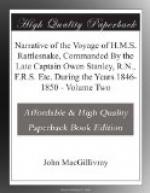Friday, 29th December.
Left our anchorage at daylight in the morning; passed between the Piper Islands and Bald Head. When off Fair Cape saw a smoke on the shore, and three natives, who immediately disappeared in the scrub and were seen no more. On rounding the Cape it became a dead calm, and it was intensely hot; we saw a smoke and a large fire ahead of us. Jackey recognised the land and said the smoke was at the mouth of a river which Mr. Kennedy and he had crossed after leaving the camp. The land where the camp and eight men were Jackey pointed out ahead of us, opposite to Weymouth Bay; a heavy squall and thunderstorm with rain came on very suddenly, and beyond the mouth of the river, with the camping-hill ahead of us, we came to an anchor, between two and three o’clock P.M.; could not see any flagstaff on the hill pointed out by Jackey, and which hill is very conspicuous and bald, nor could we see any symptom of living beings along the coast in the bay. It was too great a distance to land to-night, and the Captain said if it came on to blow the boat could not be got back again. Employed the other part of the day in looking through the glass and with the naked eye to see the flagstaff and flag, or any other sign (Jackey having informed us they would have a flag on the top of the hill) but none was to be seen, not a native, and I have reason to believe every one of the eight have been sacrificed; it looks suspicious not seeing a native, for Jackey says they used to bring fish to the camp, and there were plenty of them. The Captain is to take the ship in as near as possible to the hill, and it is determined to go on shore with the same party who assisted us at Shelburne Bay, and go up to the camp to-morrow well armed. All this evening a solemn, silent, inexpressible gloom; no rockets, no gun, no fire, to-morrow will tell a tale.
Saturday, 30th December, 1848.
At daylight this morning the ship was got underweigh, and sailed nearer in towards the hill which Jackey had pointed out as being the hill where “camp sit down,” and anchored in about two fathoms of water about half a mile off the land. Five canoes were now seen creeping off towards us from under the mangroves, with from five to ten natives in each (there was yet no flag or any token of white people on the hill); the canoes gradually neared in a string, and one came cautiously alongside, making




